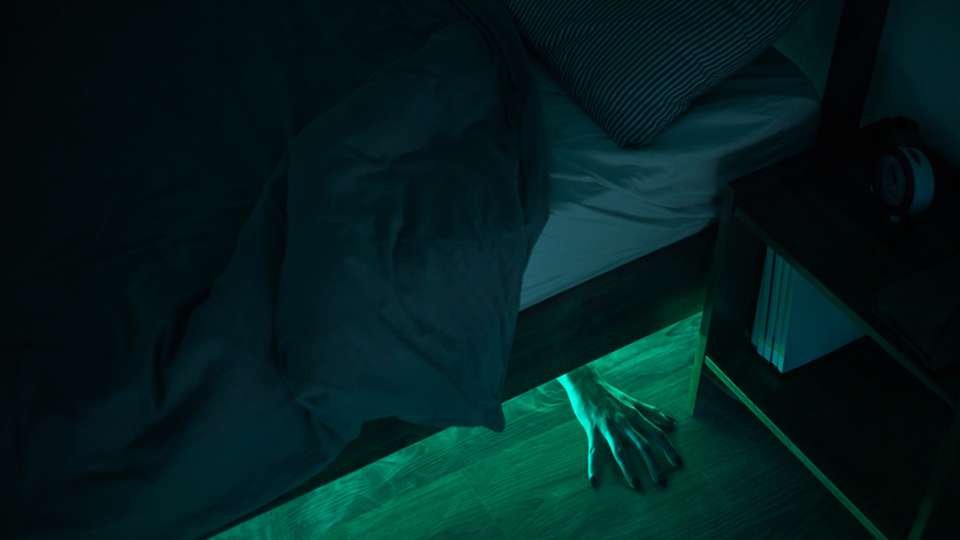
Nightmares are so scary, there are horror movie plots about them (“Nightmare on Elm Street,” anyone?). Even though we know they aren’t real, they can still disturb us, making it hard to fall back asleep or even invading our daytime thoughts.
Most of us have experienced a nightmare or two, but what can you do if nightmares are starting to disrupt your sleep — or your life?
Why nightmares happen
Nightmares aren’t just bad dreams. Nightmares produce a physiological response in the body, activating your nervous system and making you feel fearful or anxious upon waking.
Bad dreams may be unpleasant to remember when you wake up, but they don’t have the same physical impact.
Most dreaming happens during rapid eye movement (REM) sleep, including nightmares, when different areas of the brain are more active than in other stages of sleep.
Specifically, activation of the pons in the brainstem and the thalamus, hippocampus and amygdala — which are associated with memory, emotion and activation of the nervous system — is why nightmares can provoke strong, negative emotions upon waking, says Dr. Lourdes DelRosso, associate professor of Pediatrics and adjunct associate professor of Neurology at the University of Washington School of Medicine.
“These areas can have emotions or memories that are activated during the dream state without activation of areas in the brain that are responsible for self-recognition or logical reasoning, therefore the dream/nightmare usually lacks self-awareness and has illogical, strange properties,” she explains.
Other factors that can contribute to nightmares include stress, mental health disorders, recalling scary memories near bedtime and sleep disorders such as insomnia or sleep apnea that disrupt your sleep. Many medications, including common ones like blood pressure medicines, antidepressants and statins, can also cause nightmares.
What to do if you can’t fall back asleep after a nightmare
Since nightmares activate your nervous system, producing symptoms like a racing heart and sweating, it’s helpful to do things that will calm your nervous system down. Try deep breathing exercises, meditation, progressive muscle relaxation or a calming activity you enjoy such as listening to soothing music or reading.
Avoid screens or turning on bright lights, which could further disrupt your sleep, DelRosso says.
If you’re still having trouble, consider moving to a different room — maybe you can snuggle up on the couch and doze off, then go back to bed.
And if nothing is working, don’t force it. You will fall asleep eventually but worrying about it won’t help your body relax any sooner.
If you’re trying to help a child fall back asleep after a nightmare or night terror, make sure they feel safe and protected. Remind them that their dream won’t happen in real life but follow their lead for what will help them calm down, such as looking under the bed or in the closet if they ask you to check for “monsters.”
Consider reading them a story, talking about happy memories or doing something else that will help take their mind off the nightmare if they are having a harder time calming down.
How to prevent nightmares
While you can’t control your dreams and make it so you never get another nightmare, you can take steps to be better rested and reduce your chances of having a nightmare:
- Stick to a regular bedtime routine, including when you go to bed and when you get up.
- Make sure you allocate enough time for sleep. Generally, adults need between seven and eight hours each night.
- Rather than watching TV or doomscrolling on your phone, choose relaxing activities like reading or knitting prior to bedtime.
- Make your bedroom a place you feel safe and cozy in, whether that means adding a soft blanket, controlling the temperature or using blackout curtains.
- Maintaining a healthy lifestyle through regular exercise, a balanced diet, doing activities you enjoy and managing stress can all help you sleep more soundly.
- Avoid caffeine and alcohol before bed; too much of either can disrupt your sleep.
What to do if nightmares are disrupting your life
Experiencing a nightmare now and then is normal, but if you’re waking up scared on a regular basis, that could signal you have a sleep disorder.
“To be a nightmare disorder there must be recurrent nightmares that cause significant daytime distress or impairment in social, occupational or any other area of functioning,” DelRosso explains.
If you’re anxious about having nightmares, fear going to sleep, feel fatigued or have trouble concentrating during the day, it’s worth bringing up to your doctor.
Likewise, if you’re having recurring nightmares about something traumatic that happened to you, it could be a sign of post-traumatic stress disorder (PTSD) and is worth consulting a professional about.
Back to sleep
Nightmares are an unpleasant but normal part of life — unless they become so frequent they disrupt your day-to-day experiences. Being mindful about your bedtime routine and creating optimal conditions for sleep can help prevent nightmares, but if those techniques aren’t working, it’s a good idea to talk with your doctor and ask for help.

 Healthy ideas for your inbox
Healthy ideas for your inbox





